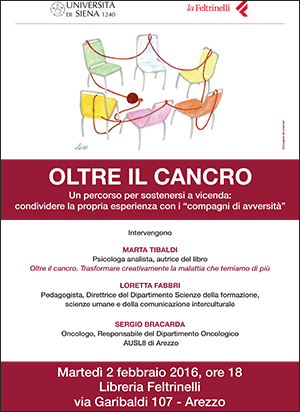Marta Tibaldi
Oltre il cancro, dieci anni dopo
Sono appena rientrata da una visita di controllo e, a dieci anni dall'insorgenza della malattia, oggi sono stata ufficialmente dimessa dal programma per malati oncologici. Ad aprile di quest'anno scadranno anche i dieci anni di esenzione dal pagamento del ticket sulle prescrizioni sanitarie: rientro così a pieno titolo tra le persone sane.
Nel libro Oltre il cancro. Trasformare creativamente la malattia che temiamo di più (Moretti & Vitali, Bergamo 2010), a proposito dei dieci anni previsti tra la diagnosi della malattia e la fine dei controlli, scrivevo:
"Le assicurazioni sanitarie coprono le spese dei malati oncologici fino ai dieci anni dalla data di insorgenza della patologia, così come l'esenzione dai ticket sugli accertamenti diagnostici da parte del servizio sanitario nazionale ha la validità di dieci anni. Che cosa vuole dire questo? Che dopo tale data siamo ritenuti guariti? O che le assicurazioni e la sanità ci immaginano già morti? Me lo sono domandato, con la curiosità di capire i criteri informatori di questa scelta..." (p. 93)
Oggi ho superato ufficialmente la soglia dei dieci anni, sono ancora viva e 'libera dalla malattia', come si dice in gergo: un lasso di tempo che offre l'opportunità di raccontare, di riflettere e di condividere un percorso sfaccettato e complesso i cui segni, nel bene e nel male, rimangono impressi nel corpo, nella psiche, nell'esistenza quotidiana, a testimonianza di un'esperienza che non si lascia liquidare come soltanto negativa. La malattia oncologica è infatti troppo piena di aspetti complessi e contraddittori per essere banalizzata in formule pregiudiziali che in primo luogo fanno torto ai malati stessi.
Perché le esperienze di malattia, di resilienza e di coraggio dei malati oncologici possano essere utili ad altri malati e a coloro che a vario titolo ruotano intorno alla malattia, patendone le difficoltà e le sofferenze, il 2 febbraio 2016 presenterò, insieme a Loretta Fabbri, Direttrice del Dipartimento Scienze della formazione, scienze umane e della comunicazione interculturale di Arezzo e a Sergio Bracarda, Responsabile medico del Dipartimento Oncologico AUSL8 di Arezzo, il progetto "Oltre il cancro" che è finalizzato, da un lato, a condividere l'esperienza della malattia e delle sue cure e, dall'altro, a conoscere gli aspetti psicologici e sociali che vi sono coinvolti: un percorso 'virtuoso' per sostenersi a vicenda e per fare della malattia un'esperienza di vita e non un naufragio. Come notavo a suo tempo: "Non si tratta più di chiederci come possiamo evitare la nostra mortalità fisica - impresa peraltro impossibile - ma come possiamo vivere in modo resiliente e creativo anche la malattia e la morte, che sono comunque un'esperienza di vita e come tale appartengono a pieno diritto all'esistenza." (p. 16)
Oggi come allora sono convinta che "Trasformando le storie di malattia in esperienze di vita, i malati oncologici diventano 'prove viventi' di come sia possibile contenere la distruttività, fino a raggiungere il versante creativo delle esperienze traumatiche stesse. Il risultato è l'acquisizione di una saggezza naturale profonda, che si esprime nel vivere con giusta misura se stessi, gli altri e il mondo; in fin dei conti, il raggiungimento di un atteggiamento più equilibrato nei confronti dell'esistenza." (p. 14)
(Foto: bandieragialla.it)

























